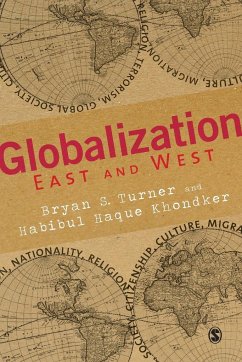A wide-ranging, significant contribution.
- Göran Therborn, Cambridge University
"A lively, well-informed, and accessible guide through the dynamics and complexities of globalization."
- Robert Holton, Trinity College, Dublin
"This is an excellent text on globalisation. It is theoretically sophisticated, critically engaging, and empirically comprehensive... perfect for courses on globalisation within sociology programmes in particular."
- Andrew Kirton, Liverpool University
Do we confuse globalization for Americanization? What are the distinctive elements in the interplay of the local and the global?
This book examines globalization from the perspective of both the West and the East. It considers globalization as a general social and economic process, and the challenges it presents for Western social science.
The meaning of a global perspective is explored through various concrete examples: religion, migration, medicine, terrorism, global disasters, citizenship, multiculturalism, media and popular culture.
Introduced with a forword from Roland Robertson, the book is brimming with novel interpretations and fresh insights that will contribute to illuminating the practical realities of globalization.
- Göran Therborn, Cambridge University
"A lively, well-informed, and accessible guide through the dynamics and complexities of globalization."
- Robert Holton, Trinity College, Dublin
"This is an excellent text on globalisation. It is theoretically sophisticated, critically engaging, and empirically comprehensive... perfect for courses on globalisation within sociology programmes in particular."
- Andrew Kirton, Liverpool University
Do we confuse globalization for Americanization? What are the distinctive elements in the interplay of the local and the global?
This book examines globalization from the perspective of both the West and the East. It considers globalization as a general social and economic process, and the challenges it presents for Western social science.
The meaning of a global perspective is explored through various concrete examples: religion, migration, medicine, terrorism, global disasters, citizenship, multiculturalism, media and popular culture.
Introduced with a forword from Roland Robertson, the book is brimming with novel interpretations and fresh insights that will contribute to illuminating the practical realities of globalization.
A wide-ranging, significant contribution
Göran Therborn
Professor of Sociology, Cambridge University
According to Turner and Khondker, globalization is an all-encompassing process by which humanity has entered a qualitatively distinct civilizational stage. Their [this] book offers a comprehensive, systematic and powerful account of the new world we are facing and will serve as an essential basis for scholarly innovations urgently required in all social sciences. This is a highly revealing yet balanced analysis of globalization that will intellectually enrich both academic and general readers
Professor Chang Kyung-Sup
Seoul National University
A lively, well-informed, and accessible guide through the dynamics and complexities of globalization. This volume shows why sociology rather than economics offers more powerful and far more subtle ways of understanding global trends and global crises
Robert Holton
Professor of Sociology at Trinity College, Dublin
Challenges the idea that globalisation is the same as Westernisation, imperialism or Americanisation. The direction of global processes is always changing, but crucially this is not a one-way street. Far too little attention has been paid to the fact that the influence of Asian culture on the West is at least as great as, if not more so, in the first decade of the 21st century as that of the West on the East
Ken Smith, Senior Lecturer in Criminology, Bucks New University
Times Higher Education (THE)
Göran Therborn
Professor of Sociology, Cambridge University
According to Turner and Khondker, globalization is an all-encompassing process by which humanity has entered a qualitatively distinct civilizational stage. Their [this] book offers a comprehensive, systematic and powerful account of the new world we are facing and will serve as an essential basis for scholarly innovations urgently required in all social sciences. This is a highly revealing yet balanced analysis of globalization that will intellectually enrich both academic and general readers
Professor Chang Kyung-Sup
Seoul National University
A lively, well-informed, and accessible guide through the dynamics and complexities of globalization. This volume shows why sociology rather than economics offers more powerful and far more subtle ways of understanding global trends and global crises
Robert Holton
Professor of Sociology at Trinity College, Dublin
Challenges the idea that globalisation is the same as Westernisation, imperialism or Americanisation. The direction of global processes is always changing, but crucially this is not a one-way street. Far too little attention has been paid to the fact that the influence of Asian culture on the West is at least as great as, if not more so, in the first decade of the 21st century as that of the West on the East
Ken Smith, Senior Lecturer in Criminology, Bucks New University
Times Higher Education (THE)

